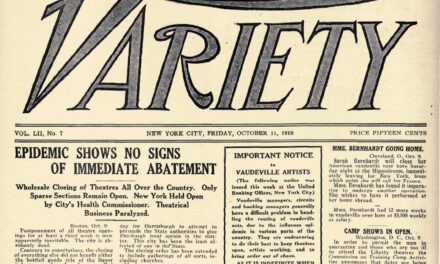‘Do you come from the land Down Under?
Where women glow and men plunder?’ ‘Down Under,’ Men at Work
I feel like I have talked about this before (Beattie 2022; Beattie 2023) but the latest iteration of Robert Thorogood’s …Paradise franchise, Return to Paradise (ABC/BBC, 2024-present, hereafter RtP) seems very familiar in its tropes, characterisation and problematic elements. For those unfamiliar with the series, it follows London Met DI Mackenzie Clarke (Anna Samson), originally of the fictitious small coastal town of ‘Dolphin Cove’ in New South Wales, Australia, as she flees from an official inquiry for suspected tampering with evidence. Rather than keeping her as an ambiguous character or focusing upon her concerns for her career, other than a desire to return to London Mackenzie’s potential legal problems are an occasionally-mentioned plot device and (spoiler, sorry) ultimately resolved off-screen (1.6). The main focus of the six episodes is Mackenzie not fitting in with those in her community and her having to confront leaving her fiancé, forensic specialist (and the son of her boss, Senior Sergeant Constable Philomena Strong, Catherine McClements) Glenn Strong (Tai Hara), at the altar six years prior.
While a fixation on a central romance is not uncommon to the …Paradise franchise regardless of the gender of the lead character, with a female lead this still tends to fall into the typically gendered roles I have noted previously in the franchise (Beattie 2023). Female characters are positioned as wives, mothers or analogous; Mackenzie is characterised as a runaway bride, her boss Strong is a mother and would have been Mackenzie’s mother-in-law. Civilian aide Reggie Rocco (Celia Ireland) is an older woman who is a retired teacher. Though implied to be a lesbian, she is not in a relationship with anyone[i] and she functions as a maternal figure to Mackenzie and Constable Felix Wilkinson (Aaron McGrath), a young Indigenous man who, like Mackenzie, was Reggie’s student.[ii] Mackenzie’s immediate subordinate, the British DS Colin Cartwright (Lloyd Griffith), is also very newly appointed to his position so often follows Mackenzie’s lead. Though possibly analogous to the multiple female and French DS characters on DiP, most of those characters are love interests of their English DI. While Colin is not a love interest, that can be read as a female leader not being considered as a potential partner, as an English character being unable to see an Australian as a partner or it could also imply a consideration of the power imbalance between a DI and DS.[iii] As with BP, though female detectives have the possibility to disrupt conservative norms (Hoffman, 2016) RtP does not seem to attempt to do so.
This is evident in two main ways. Elder (2007) notes that the ‘parameters of being a “good woman” in Australia […] tend to include not being too sexual, looking good, being pleasant, not showing up men and not “misbehaving”’ (Elder, 2007: 68–69). In this instance, we see Mackenzie violating several of these norms, yet still bound by them. She is characterised by the townspeople, notably taxi driver Trevor (Ron Smyck) who harangues her at every opportunity, as a runaway bride (‘misbehaving’). Because she is falsely accused of tampering with evidence she has to flee London and can only stay at her mother’s beachfront shack (much like the DI shack in DiP) which means she is positioned as a daughter, though not mother– because she is unmarried that may be considered unseemly. Yet she is also shown as not fitting in, beyond the ways in which British DIs Poole (Ben Miller) and Parker (Ralf Little) did not fit their Caribbean surroundings in DiP. Like her DiP counterparts, she does ‘show up’ her colleagues regardless of gender, her costuming is repetitive rather than relaxed (as noted repeatedly in the text), and while she is not particularly sexual (or sexualised), she is abrasive and dismissive rather than ‘pleasant.’
This series of ‘transgressions’ of gender norms can be read as generic; Mackenzie is almost a pseudo-Sherlock from the BBC’s Sherlock (2010-2017); she rarely eats or drinks and has a strong focus upon whatever her case of the week is. Mackenzie is also socially awkward, has difficulty with social cues and, when having strong emotions finds it difficult to express them healthily. Though arguing that RtP is writing (and/or that Samson is performing) her as neurodivergent is likely a bridge too far (as subverting or representing neurodivergent people explicitly has not been acknowledged within the text or in any paratext that I have found, Mackenzie can be read as a vague pastiche of or reference to neurodivergence(cf Johnson, 2021; Rajan, 2021). While representation of successful neurodivergent people would most certainly be welcome, RtP does not seem to do that. Though something of a maternal figure, Strong, after stating in 1.2 that Mackenzie’s brain ‘works differently,’ tells her not to be ‘a pain.’ If Mackenzie is read as neurodivergent, then Strong’s statement is ableist; Calton and Hall (2022) note a consistent dearth of understanding neurodivergence in police encounters with individuals on the autism spectrum.
This problematic representation is compounded in 1.6. When informed that she can return to London, Mackenzie finds herself torn between staying and leaving. This culminates in her briefly crying at work when speaking with Strong. Both women find the emotional display appalling, with Strong later referring to it as ‘grotesque.’ This not only again implies ableism (cf Esposito and Venuti, 2008 and Calton and Hall, 2022, on autism and emotional dysregulation) but it is also tied in with toxic/hegemonic discourses of masculinity which derides emotion as weakness (Sculos, 2017). That the characters involved are women and RtP is a comedy does not ameliorate this problem; if anything, it enhances it as the context can be read as making light of sexism and ableism within the Australian police (Calton and Hall, 2022; Stevenson and Hopkins, 2024).
The …Paradise franchise seems to have carved itself a niche in the wider BBC (including BBC Studios Australia) with its attributions of a beachside touristic ‘paradise’ outside London and/or the UK where only those from London/the UK and/or trained there can maintain law and order. Yet those constructed paradises, one fictitious British Overseas Territory and fictitious cities within real countries in the case of BP and RtP, do a disservice to the places they film with such shallow engagement with local matters, cultures and peoples and by expressing such conservative social norms. Rather than risk challenging the viewer, however, other (and Othered) places are mere backdrops to recognisably British-associated and …Paradise-generic-associated characters and tropes. And it is that reductive representation which, instead of dying a symbolic death or gone one step beyond, has come back to BBC One.
Dr Melissa Beattie is a recovering Classicist who was awarded a PhD in Theatre, Film and TV Studies from Aberystwyth University where she studied Torchwood and national identity through fan/audience research as well as textual analysis. She has published and presented several papers relating to transnational television, audience research and/or national identity. She is suddenly an independent scholar. She has worked at universities in the US, Korea, Pakistan, Armenia, Ethiopia and for a brief time in Cambodia. She can be contacted at tritogeneia@aol.com.
FOOTNOTES
[i] The series does do much better with LGBTQIA people than earlier iterations. In 1.4 an environmental activist is killed and his husband, though a suspect, is not the murderer (unlike in multiple episodes of DiP and a lesbian couple in BP who were thieves). Neither character is considered criminal and they do share an on-screen kiss to make it clear that they are a married couple.
[ii] The series acknowledges traditional Indigenous ownership of the land in multiple episodes and also addresses the erasure of Indigenous people from Australia’s history and mythology (1.5) though the latter is done in service to the murder which Mackenzie solves through using written and photographic history. This is done is response to Felix’s telling of oral history which keeps an Indigenous partner to a white mythologised antihero; as it is the written/photographic evidence this is brought in as proof, however, this plotline still prioritises white/Eurocentric interpretations of history, spoken/realised by a white lead, over Indigenous orally-transmitted knowledge. Felix’s Indigenous Nation is also not explicitly stated, potentially implying an elision of the multiple Indigenous cultures in what is now New South Wales.
[iii] Colin appears enamoured more with Australia/Dolphin Cove than with any individual.
REFERENCES
Beattie M (2023) One step beyond (and two steps back?): Beyond Paradise. Critical Studies in Television blog. Available at: https://cstonline.net/one-step-beyond-and-two-steps-back-beyond-paradise-by-melissa-beattie/
Beattie M (2022) ‘You can get it if you really want’: The use of Caribbean music genres in Death in Paradise. Journal of Popular Television 10(3): 231-246.
Calton S and Hall G (2022) Autistic adults and their experiences with police personnel: a qualitative inquiry. Psychiatry, Psychology and Law 29(2): 274–289.
Elder C (2007) Being Australian: Narratives of National Identity. Sydney: Allen & Unwin
Esposito G and Venuti P (2008) How is crying perceived in children with Autistic Spectrum Disorder. Research in Autism Spectrum Disorders 2: 371–384
Hoffman M (2016) Gender and Representation in British ‘Golden Age’ Crime Fiction: Women Writing Women. Houndmills: Palgrave MacMillan.
Johnson M (2021) Psychopath, sociopath, or autistic: Labeling and framing the brilliance of Sherlock Holmes. In Johnson M and Olson C J (eds), Normalizing Mental Illness and Neurodiversity in Entertainment Media: Quieting the Madness.London: Routledge, pp. 83-95.
Rajan B (2021) Popular culture and the (mis)representation of Asperger’s: A study on the sitcoms Community and The Big Bang Theory. Johnson M and Olson C J (eds), Normalizing Mental Illness and Neurodiversity in Entertainment Media: Quieting the Madness. London: Routledge, pp. 66-82.
Sculos B W (2017) Who’s afraid of ‘toxic masculinity’?. Class, Race and Corporate Power 5(3): n.p. DOI: 10.25148/CRCP.5.3.006517
Stevenson A and Hopkins S (2024) Sexism, misogyny, and gender violence: feminist political thought in the colonial, heteropatriarchal, carceral state of Australia. In Caputi M and Moynagh P (eds.), Research Handbook on Feminist Political Thought. Cheltenham: Elgar, pp. 159-191.





